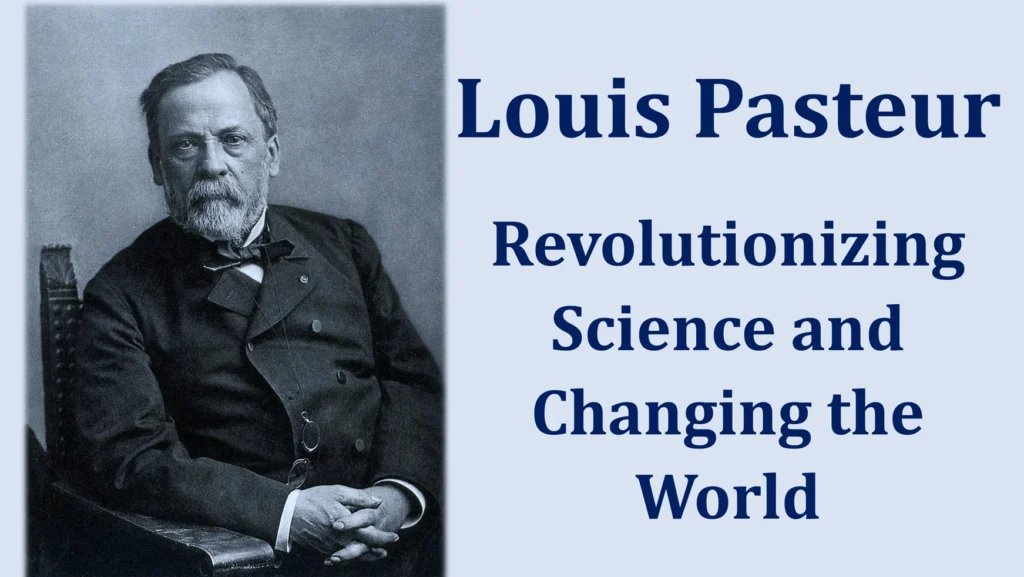
Introduction
Louis Pasteur had a really big impact on science and how we live. He did important work in studying tiny organisms, helping with medicine, and improving public health. His work changed how we understand the tiny living things around us. Furthermore, his work has played a role in advancing disease prevention and treatment. In this article we will explore the life of Louis Pasteur from his years and education to his discoveries that continue to leave a lasting impact on our lives today.
Early Life and Education: Nurturing the Curious Mind
The humble beginnings in Dole, France
Louis Pasteur was born on December 27th, 1822, in a town called Dole in France. His parents were Jean Joseph Pasteur and Jeanne Etiennette Roqui. His father used to work with leather. Despite not having money or high social standing his family taught him the importance of work and encouraged his desire to learn.
Family background and influence
Pasteur’s curiosity was greatly influenced by his family background. His father, Jean Joseph Pasteur had a love, for reading. Urged his son to delve into the wonders of the world through books. This nurturing environment, combined with his mother’s encouragement laid the groundwork for a Louis to flourish.
Childhood experiences that sparked curiosity
Various encounters sparked Pasteur’s curiosity throughout his boyhood. He watched a local sheep lose an eye due to an untreated illness in one such occurrence. This event, along with observing the impact of diseases on livestock, fueled his desire to understand the causes and prevention of illnesses.
Education at the Royal College of Besançon
Pasteur’s educational journey commenced at the Royal College of Besançon where he demonstrated talent in his pursuits. He showcased proficiency, in chemistry and physics disciplines that would eventually form the bedrock of his groundbreaking achievements.
Pursuit of scientific knowledge at École Normale Supérieure
Embracing the scientific method
After finishing his studies at the Royal College, Pasteur joined the École Normale Supérieure in Paris. It was there that he further explored his love, for investigation and refined his abilities in applying the method. This methodology would come to define his experiments and breakthroughs.
Formative experiences and mentors
During his time, at École Normale Supérieure Pasteur had the privilege of learning from scientists and researchers. Jean Baptiste Dumas was a renowned mentor who helped shape Pasteur’s rigorous approach to experimentation and attention to detail.
Preparing for a career in academia
As Pasteur approached the end of his studies he aspired to embark on a career. His innate. Potential for groundbreaking research garnered recognition and respect from his professors opening doors for contributions, to the scientific community.
Pasteur and Microbiology: Unveiling the Invisible World
Louis Pasteur as a person made contributions, to the field of microbiology which had an impact on the scientific community and our perception of the world. Through experiments and important breakthroughs Pasteur successfully unraveled the mysteries surrounding germs and disease-causing microorganisms. His groundbreaking discoveries questioned existing beliefs. In the sphere of medicine, he paved the road for advancement.
Groundbreaking research on germs and disease-causing microorganisms
Investigating the role of microorganisms in fermentation
Pasteur’s exploration of microbiology started with his experiments, in fermentation. During that period, it was widely believed that fermentation was purely a chemical process. However, Pasteur’s meticulous observations and rigorous experiments unveiled a truth. He came to understand that fermentation occurred due to the existence of organisms called bacteria. This groundbreaking revelation shook the community. Laid the foundation for further investigations, in the world of microorganisms.
Pioneering the concept of pasteurization
Pasteur’s experiments involving fermentation led him to develop the concept of pasteurization. By realizing the impact of bacteria, on food quality and human health he devised a method to eliminate these microorganisms by subjecting the product to specific temperatures. This groundbreaking technique of pasteurization did not extend the shelf life of goods but also revolutionized the entire food and beverage industry. Today this simple effective approach is widely employed worldwide.
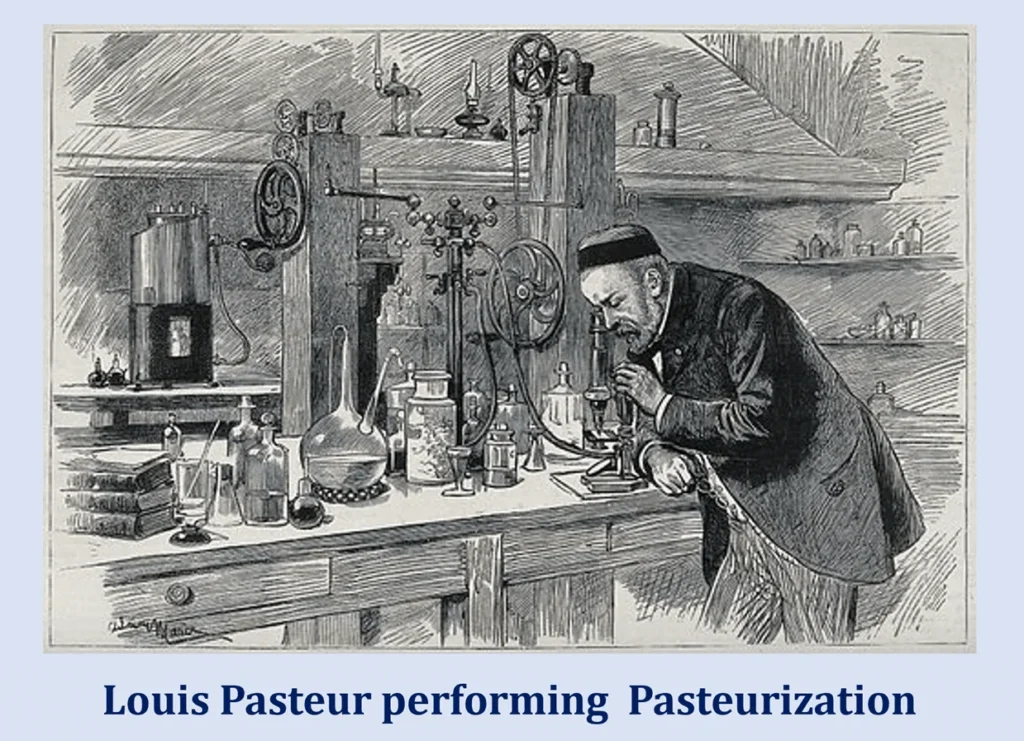
Challenging prevailing beliefs about spontaneous generation
Another noteworthy contribution of Pasteur was his challenge to the accepted notion of generation which proposed that living organisms could spontaneously emerge from non-living matter. Through a series of experiments Pasteur refuted this theory demonstrating that living organisms only arise from preexisting living organisms. This rejection of generation marked a milestone in biology’s history firmly establishing the concept of biogenesis and paving the way for deeper insights, into the origins of life.
Revolutionary insights into infectious diseases
Germ theory and its impact on healthcare practices
Louis Pasteur made a contribution, to the field of science by introducing the germ theory of disease. He proposed that various illnesses were actually caused by microorganisms challenging the prevailing belief, at that time which attributed diseases to the air (known as the miasma theory). Pasteur’s germ theory brought about a revolution in healthcare practices highlighting the significance of cleanliness, sterilization and preventing infections. This fundamental change in knowledge formed the basis, for healthcare practices and greatly enhanced public health on a global scale.
Developing effective vaccines against deadly diseases
His contributions, to the field of immunization based on his germ theory have been remarkable. His amazing work helped create vaccines that save lives and stop diseases from spreading. One big accomplishment was making the rabies vaccine, which helped stop the spread of that illness. Additionally, Pasteur’s efforts in developing a vaccine for anthrax helped eradicate it among livestock. These contributions have had an impact on health with vaccination becoming a fundamental aspect of disease prevention.
Controversies and debates surrounding Pasteur’s theories
Unsurprisingly Pasteur faced skepticism and controversy regarding his ideas. Some scientists and intellectuals at the time challenged his theories. Engaged in debates. However, through methods and undeniable success, in experiments and vaccine development opposition gradually subsided. Eventually Pasteur’s theories gained acceptance transforming the field of microbiology and revolutionizing our understanding and approach to combating diseases.
Contributions to Medicine and Public Health: Saving Lives and Preventing Epidemics
Pasteur’s incredible accomplishments went beyond breakthroughs. His practical contributions and unwavering dedication to medicine and public health had an effect, on preserving lives and averting outbreaks.
Vaccination: A breakthrough in disease prevention
Developing a rabies vaccine
The Development of Rabies Vaccine was one of the Pasteur’s greatest contributions to vaccination research. This terrible viral infection had tormented civilization for generations. Pasteur’s successful development of a vaccine brought hope to numerous people. Through experimentation Pasteur discovered a method to weaken the virus without compromising its capacity to trigger a response. This breakthrough laid the foundation for preventing and managing rabies ultimately leading to the salvation of lives.
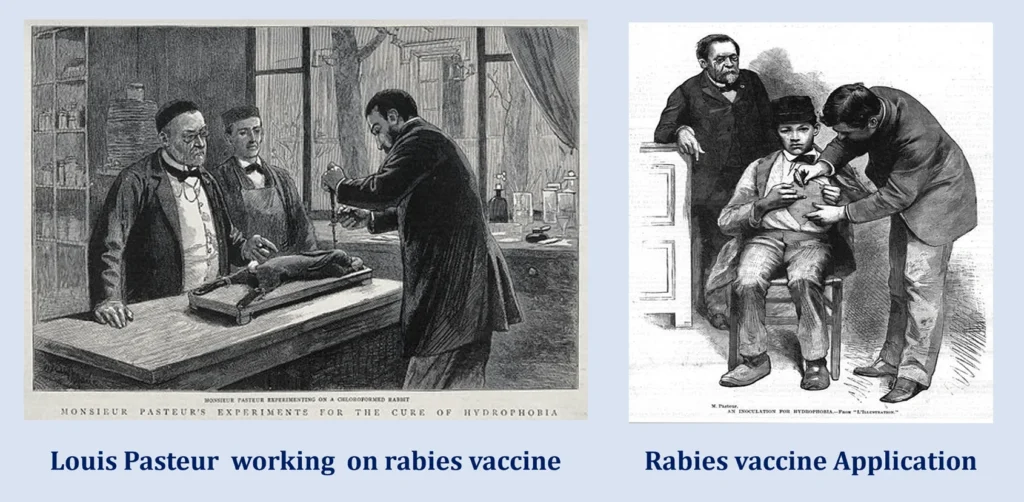
Successful eradication of anthrax in livestock
Pasteur achieved another accomplishment in his career by successfully eliminating anthrax in livestock. Before Pasteur’s efforts this bacterial disease caused damage, to the farming sectors. By creating a vaccine Pasteur effectively shielded animals from anthrax infection stopping its spread to humans and safeguarding livelihoods. His achievement in controlling anthrax stands as a testament to the effectiveness of vaccination, in fighting against diseases.
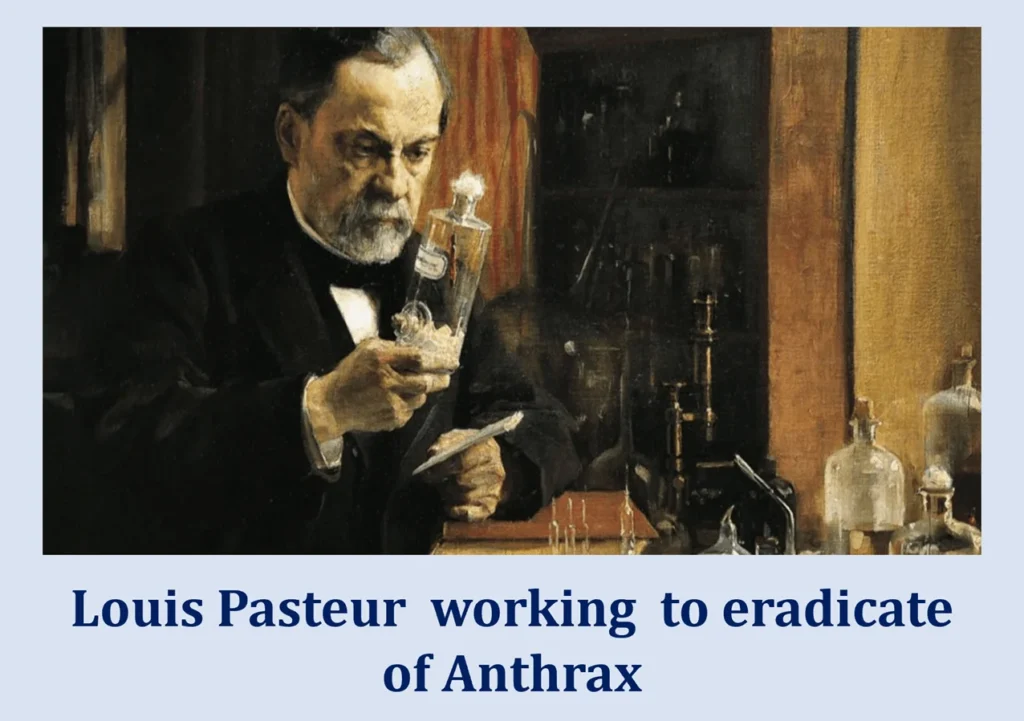
Popularization of vaccination worldwide
Pasteur’s groundbreaking. The successful use of vaccination transformed health practices on a global scale. His findings ignited the acceptance of vaccination, as a measure for disease prevention. Governments and healthcare organizations worldwide swiftly implemented vaccination programs leading to lives saved and the prevention of epidemics. Pasteur’s impact on public health endures today with vaccination being recognized as one of the remarkable accomplishments, in medical history.
Pasteur Institutes and the legacy of medical research
Establishing research institutions for scientific progress
Motivated by his passion, for advancement Pasteur founded the Pasteur Institutes as hubs for research. These establishments attracted individuals, from scientific fields promoting collaboration and inventive thinking. The Pasteur Institutes gained fame for their findings and the education of generations of scientists. Pasteur’s vision and the enduring impact of these institutes persistently influence research and scientific progress.
Training future generations of scientists
Pasteur’s commitment, to educating and guiding scientists is a part of his legacy. He deeply understood the value of nurturing talent and sharing knowledge with generations. Thanks to his mentorship many scientists were able to make contributions in their fields. The tradition of mentorship and the pursuit of excellence that Pasteur established still thrive today serving as an inspiration, for the generation of scientists.
Global impact of Pasteur’s Institutes
The impact of the Pasteur Institutes stretches beyond Frances borders. These institutions have played a role, in advancing research on a global scale. Scientists from over the world collaborate. Exchange their discoveries facilitating the creation of innovative treatments, vaccines and diagnostic tools. The Pasteur Institutes are renowned for their excellence. Remain at the forefront of various fields leaving an enduring impression on the international scientific community.
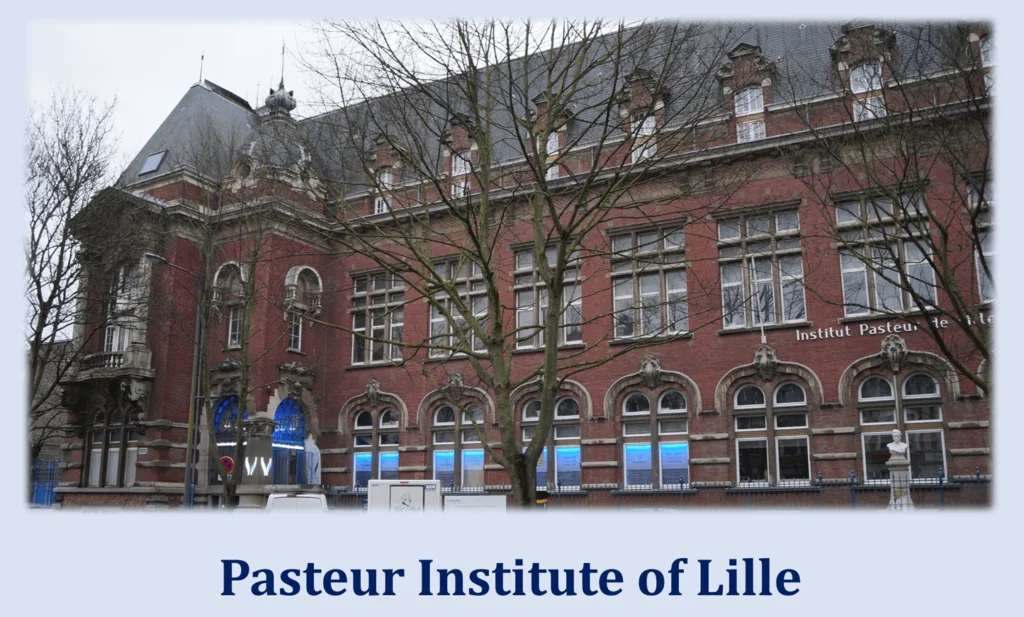
“In the field of observation, chance favors the prepared mind.”
– Dr. Louis Pasteur
The Louis Pasteur Awards Honor Scientific Excellence
Louis Pasteur, a famous scientist, got lots of important awards during his career. His big discoveries in microbiology, chemistry, and medicine made many respected groups around the world recognize and praise his work.
Scientific Innovations Are Recognized
Pharmaceutical Society Award (1853)
In 1853 Pasteur was acknowledged by the Pharmaceutical Society for his groundbreaking research, in synthesizing acid. As a gesture of recognition for his achievements he received a sum of 1,500 francs.
Rumford Medal from the Royal Society of London (1856)
The Royal Society of London bestowed the Rumford Medal upon Pasteur in 1856 as an appreciation of his discoveries. This esteemed accolade celebrated his understanding of acid and its correlation with polarized light highlighting his noteworthy contributions, to molecular comprehension.
Copley Medal for Fermentation Studies (1874)
In 1874, Pasteur received the Copley Medal for his important work on fermentation. This award made him well-known as a leader in microbiology and chemistry, and his discoveries helped improve how we make food.

Commendations from the French Academy of Sciences
Montyon Prize (1859)
Pasteur’s remarkable skills, in physiology were acknowledged by the French Academy of Sciences when they awarded him the Montyon Prize. This recognition highlighted his abilities in investigation.
Jecker and Alhumbert Prizes (1861, 1862)
His experimental refutation of spontaneous generation led to Pasteur receiving the Jecker and Alhumbert Prizes in consecutive years, further highlighting his significant contributions to advancing scientific knowledge.
Global Accolades and International Influence
Académie Nationale de Médecine and Académie française
Pasteur’s influence extended beyond borders, with memberships in esteemed institutions like the Académie Nationale de Médecine and a seat at the Académie française, illustrating his global recognition.
Honors from International Institutions
Recognitions from international bodies included memberships in the Royal Netherlands Academy of Arts and Sciences, the American Philosophical Society, and honors from the Ottoman Sultan Abdul Hamid II, who awarded him the Order of the Medjidie (I Class) and 10,000 Ottoman liras in 1886.
Prestigious Honors and Culmination of Excellence
Albert Medal and Cameron Prize
Pasteur was honored with the Albert Medal, by the Royal Society of Arts. Also awarded the Cameron Prize for Therapeutics from the University of Edinburgh recognizing his achievements, across multiple scientific fields.
Legion of Honour
The French government recognized Pasteur’s contribution by increasing his rank in the Legion of Honour. He was first honored as a Chevalier in 1853. Eventually became a Grand Cross in 1881. This progression reflects his commitment, to exploration and his remarkable dedication, to serving humanity.
The Legacy of Louis Pasteur
Influence on modern scientific practices
Pasteur’s invaluable contributions have shaped the field of microbiology and revolutionized scientific practices. His dedication, to experimentation the utilization of the approach and the quest for understanding have now become customary procedures in laboratories, around the globe.
Shaping the field of microbiology
Pasteur’s contributions have established the groundwork, for microbiology. Through his findings we have gained insights, into the functions of microorganisms in both our well being and ailments. These breakthroughs have not facilitated the development of life saving antibiotics. Also improved infection control protocols significantly.
Inspiring advancements in infectious disease research
Pasteur’s groundbreaking research inspired many scientists to dig deeper into understanding diseases. His methods and ideas still help today’s researchers as they try to solve the mysteries about viruses, bacteria, and other harmful germs.
Implications of Pasteur’s discoveries in current times
Pasteur’s findings have implications, in today’s world. They extend to aspects, including the fight, against newly emerging diseases the creation of innovative treatments and vaccines. His research serves as a reminder of the significance of investigation and its potential to enhance public health.
Societal impact beyond the scientific realm
Pasteur’s influence extends beyond the realm of science, profoundly impacting various sectors of society.
Revolutionizing food and beverage industries
Pasteurization has brought about a transformation, in the food and beverage sectors guaranteeing the safety and extended shelf life of products. This process has effectively eliminated microorganisms thereby preventing instances of food poisoning and bolstering the overall security of our food supply chain.
Public health reforms and improved sanitation practices
Pasteur’s contributions to disease prevention had an impact, on health leading to important reforms. His advocacy for hygiene sterilization techniques and the widespread use of vaccinations led to improved sanitation practices and a decrease in the occurrence of diseases.
Inspiring future scientists and fostering scientific curiosity
Furthermore, Pasteur’s remarkable ability to inspire and nurture curiosity has left a mark on future generations of scientists. His relentless pursuit of knowledge unwavering curiosity and dedication to inquiry have served as a guiding light, for aspiring researchers across fields. As a result, his influence continues to foster curiosity and drive innovation in areas of study.
Summary and FAQs
Recap of Louis Pasteur’s exceptional journey
Louis Pasteur’s life story is an incredible journey filled with scientific discoveries, new ideas, and never giving up. He started from a simple life in Dole, France, and became someone highly respected in the world of science. His work changed the world forever.
Louis Pasteur’s contributions to science, medicine and public health are immeasurable. Through his groundbreaking experiments, revolutionary insights and practical applications Pasteur forever altered our understanding and approach to combating diseases. His development of vaccines, popularization of vaccination practices and establishment of research institutions have saved lives prevented epidemics and paved the way for modern medicine. Louis Pasteur’s legacy remains a source of inspiration and guidance in today’s world cementing his position, as one of history’s figures.
Frequently Asked Questions (FAQs)
How did Louis Pasteur change medicine?
Louis Pasteur had an impact, on the field of medicine through his contributions. He introduced the concept of germ theory, which greatly improved our understanding of diseases. Additionally, Pasteur’s work led to advancements in vaccines and the invention of pasteurization. These groundbreaking discoveries formed the basis, for medicine. Greatly enhanced public health.
What were some contributions made by Pasteur?
Pasteur made contributions, including his understanding of how bacteria aid, in fermentation his creation of pasteurization his development of vaccines for rabies and anthrax and his remarkable advancements in comprehending infectious diseases. These discoveries had an impact, on scientific domains.
How did Pasteur’s work influence our understanding of diseases?
Pasteur’s research transformed our comprehension of illnesses and healthcare by introducing the notion of germ theory. This breakthrough concept revolutionized our approach to disease prevention and treatment. This groundbreaking theory has had reaching effects leading to the development of vaccines improved sanitation practices and effective measures to control infection. As a result, countless lives have been. The spread of diseases has been significantly curtailed.
